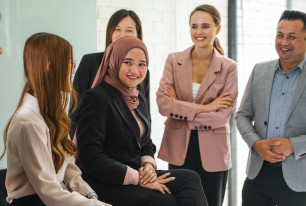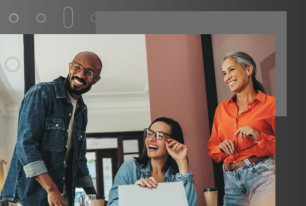How the Pandemic Changed My View on Candidate Experiences
Learn how candidate experiences in the hiring process impact employee engagement from my first-hand account of job searching during the pandemic.
Share
“Recent research conducted amongst 14,000 jobseekers tell us that as many as 87% say that it is the way they are treated during the application and interview stages that will determine whether they join or not.” - Two Heads Consulting Proprietary Research, 2018, taken from Why Candidate Experience Still Remains Elusive for Most Organizations
Finding the right job is tough, especially during uncertain times of social distancing and ever-changing lifestyle restrictions that we have had to endure over the past 2 years.
As we continue to navigate the pandemic, many ‘new normals’ are still evolving, from Covid variants to knock-on effects such as the Great Resignation. One thing is for certain, people are showing new levels of resilience and confidence in making changes for happier, healthier, and better-balanced lives, and in the context of work that could result in changing industry, prioritizing remote roles, or swapping jobs for a better benefits package.
For organizations, the trend mentioned above indicates the heightened importance of finding ways to attract talent and retain them. This means that candidate experiences during the hiring process have also become a top priority, as they bring a huge impact, especially in isolated and uncertain circumstances of the pandemic. What candidates experience and feel during the whole process will also affect their engagement with the company, even after they are hired.
How candidate experience impacts employee engagement post onboarding.
After my previous role had ended with redundancy, I found myself in the position of a home-based job seeker. With support from family and friends, I used the opportunity to check in with my professional self. Compiling a list of what I enjoy working on, including previous successes and areas I would like to develop in the future, helped me create a checklist to shortlist potential new jobs. Sourcing roles was the same, even when house-bound; researching the company tends to be online through their website and social profiles and getting a sense of the type of place it would be to work at through Glassdoor - although I was paying more attention to employee reviews on how companies had faired during the crisis. At the time, the UK was amid the second Covid-19 peak, and most of everyday life was in isolation from the lockdown restrictions. Admittedly, applying for roles in isolation was not too different from pre-pandemic, and nor was the initial screening phone call. But this is about where the similarities ended!
Previous recruitment processes I have experienced tend to have first-stage interviews in the office, and normally in person with future colleagues. With social restrictions in full swing, this stage was a phone interview with the role manager. Whilst the information shared was similar (about myself and my experience, as well as the new opportunity), getting a sense of the company and organizational culture was much harder to gauge.
Moving through the remote recruitment process and preparing for follow-on interviews did not feel too different from pre-pandemic. But the team face-to-face video interview was a first for me! Being a remote candidate was very different from in-person interviewing. Even though I was sitting in my home office, I was still experiencing the waves of pre-interview nerves. The SHL team was welcoming and friendly, giving not only a great impression but also a real insight into the company and team culture. They asked constructive questions and made me feel at ease, positively impacting my experience as a candidate and influencing my decision to accept the job offer later. Most importantly, this was crucial in helping to form a foundation relationship with future co-workers.
The experience I had as an applicant and connection to the company was a big deciding factor when it came to accepting the job offer, as was the support and communication of the internal recruiter, who even sent me through some photos of the office I would someday head to! This open communication really helped me envisage being part of the company and feel excited about getting started, even though I had never physically met any of my colleagues, nor visited the office where I would be based.
The experience I had as an applicant and connection to the company was a big deciding factor when it came to accepting the job offer.
Looking back on the SHL recruitment process, every interaction was creating a perception of what working life would be like as part of the team. Every person I interacted with (their open communication and constructive feedback throughout the process) had an impact on how I felt about the role. Being isolated and remote enhanced these feelings and was paving the way for my connection to the company as an employee.
Joining the team and onboarding during lockdown meant my first 3 months were completely remote, but this did not impact the strong support, training, and warm welcome that I had from the get-go! Now 9 months on, I have been able to work in the office a few times and meet a handful of my global colleagues in ‘real’ life. The experience I had throughout the hiring process (I am pleased to say!) has been a true reflection of not only the role, but the organization itself, and I’m excited to kick off 2022 feeling part of such a great team.
Investing in candidate experiences ensures not only the right hire but establishes a foundation to set new joiners up for future success within your organization. Utilize SHL’s recruitment software to give candidates personalized and valuable experiences, even at scale.
Check out our whitepaper to learn about six shifts that can help you build a world-class candidate experience.









